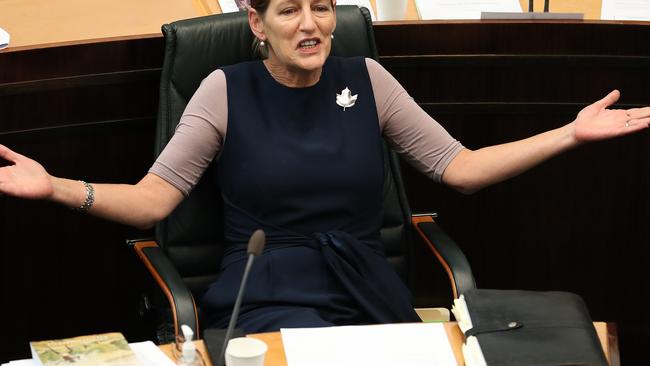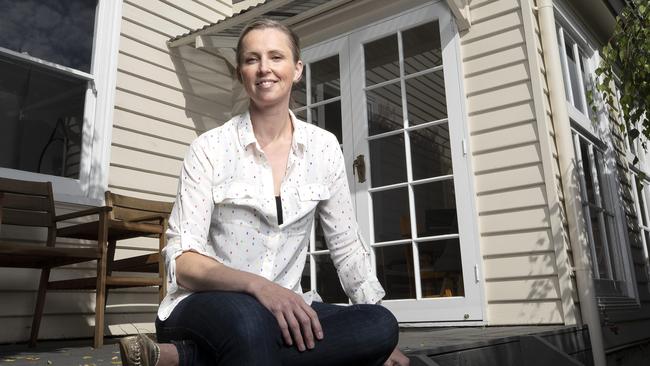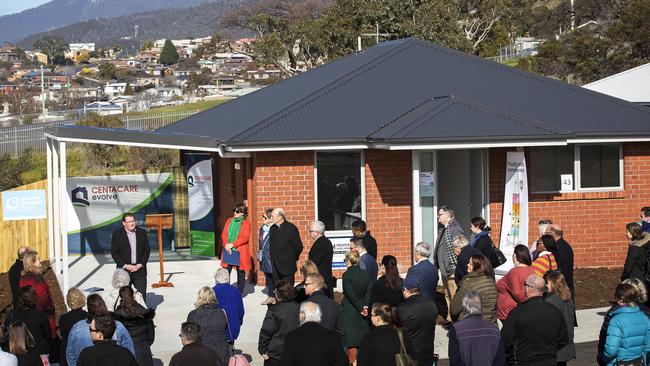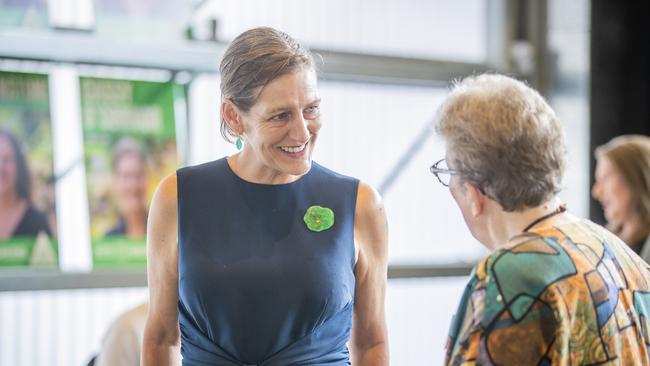Labor, Liberals combine to kill Green rent cap bill bid
The Greens say it was “gut-wrenching” to be teamed up on by the major parties, after proposing a rent control bill modelled on the Australian Capital Territory’s. LATEST >>
Politics
Don't miss out on the headlines from Politics. Followed categories will be added to My News.
A GREENS attempt to put a cap on rent rises has been voted down.
Labor and independent Madeleine Ogilvie joined with the government to oppose the Residential Tenancy (Rent Control) Amendment Bill in state parliament.
The bill would have put in place a cap on rent increases to CPI plus 10 per cent and limited then to once per year.
Greens leader Cassy O’Connor said the lack of support for the bill — which mirrored provisions in the Australian Capital Territory — was “gut-wrenching”.

“Instead of providing basic, compassionate support to Tasmanian tenants – proper protection from massive, exploitative rent hikes – the Labor and Liberals parties, and Ms Ogilvie, voted against relief for tenants,” she said.
“The stories of hardship pouring out of the community, along with the data that confirms Tasmania as the least affordable place in the nation for renters, made no difference.
“This was to be expected from the Liberals – a party with a long track record of prioritising profits for the propertied class over rights for those who are not.
“We were, however, shocked that Labor lined up alongside them.”
Labor Housing spokeswoman Alison Standen said rent control laws ran the risk of unintended consequences.
“Rent controls may lead to landlords either removing entire dwellings from the long-term rental market for good, or shifting properties into the short stay accommodation market, potentially making the availability of rental properties even worse and further reducing the security of tenure for tenants,” she said.
Louise Elliot from the Tasmanian Residential Rental Property Owners Association welcomed the bill’s demise.

“The TRRPO is relieved that the rent control will not progress further, not only because we believe that owners should be able to set the price for their own product but because we also strongly believe that the bill would make the rental crisis worse by driving up prices further and does nothing to address the actual root cause of the housing crisis, being substantial undersupply,” she said.
The state government on Wednesday extended the COVID-19 Rent Relief Fund and COVID-19 Landlord Support Fund, from March 31 to June 30.
“So far under this program we have provided more than $3.65m of financial support to Tasmanian residential tenants and landlords experiencing severe hardship since May 2020,” Building and Construction Minister Elise Archer said.
Welfare agencies urge more action on housing crisis
Cameron Whiteley
March 14, 2021
ON THE third anniversary of a summit held to address Tasmania’s housing crisis, welfare agencies have urged the state government to re-evaluate its strategy and set more ambitious targets to build new homes.
The housing summit was staged on March 15, 2018, soon after the re-elected Hodgman Liberal Government and since then, more than 1000 social housing and supported accommodation places have been added.
But almost 3600 applications remain on the social housing register, more than in March 2018, while it takes almost 64 weeks on average to house priority applicants.
Colony 47 chief executive Danny Sutton said he believed while solid progress had been made in the past three years, more needed to be done.

“We acknowledge that the Tasmanian Government has made significant funding commitments to social and affordable housing but it doesn’t make a difference for the people we work with until they get the keys in their hands,’’ he said.
Mr Sutton said the organisation was particularly worried about youth housing, and suggested the government commit at least 20 per cent of its funding for new housing to meet the needs of young people, given that cohort makes up the same percentage of those on the waiting list.
Tasmanian Council of Social Service chief executive Adrienne Picone said while acknowledging the government’s efforts, the increasing social housing waiting list was evidence much more work was needed to “break the back” of the crisis.
Shelter Tasmania chief executive Pattie Chugg said more ambitious targets were needed to deal with a “chronic” rental shortage which needed to be addressed urgently.
Ms Chugg suggested 10,000 additional dwellings could be delivered over the next decade at a rate of 1000 year.
Housing Minister Roger Jaensch said the government was delivering more houses, faster than ever before, and its total investment in social housing increased 24.2 per cent in 2019-20.
He said 1500 new homes for social housing would be built over the next three years to the end of June 2023, including more than 400 in the next 12 months.
Greens detail rent cap plan at campaign launch
Sue Bailey
March 14, 2021
THE Tasmanian Greens have kicked off their state election campaign with a plan for a youth wage — and detailing their plan for a cap on rents.
In an address to the party’s special state conference at Kingston on Saturday, Greens leader Cassy O’Connor said the party would include a youth job guarantee as a first step towards a national job guarantee.

“We’ll pay young people a living wage to rewild lutruwita/Tasmania, to green, and thus cool our cities and towns, to plant urban food forests for health and food security, and to fill some of the vast need for extra workers in the aged and disability care sectors,” she said.
Ahead of the state election, due by March 2022, she said the party was “in great shape” with the membership of the Young Greens growing.
“A shining light this year has been the Young Greens, a beacon of positive energy and hope,” Ms O’Connor said.
“At the recent UTAS Societies Day in Hobart, the Young Greens signed up 103 new members. I hear one of our Young Greens sidled up to the Young Liberals’ stall and was told they’d convinced 12 people to sign on.”
Ms O’Connor said the Greens were up against a “popular” Premier in Peter Gutwein, but he had ignored tenants struggling with rent increases.
She said the Greens were being inundated with tenants facing “soaring rents” and there were no restraints on landlords.
“We have people coming to us facing rent rises of $50, $80 and $100 a week,” Ms O’Connor said.
“We’re not out of this pandemic by a long shot, but Mr Gutwein has already abandoned tenants facing massive rent hikes.”
Ms O’Connor has written to Labor leader Rebecca White, Speaker Sue Hickey and independent member for Clark Madeleine Ogilvie seeking support for the cap, which she will move for during private members’ time in Parliament on March 24.
Under the proposed cap, tenants would be able to challenge rent increases above CPI before the Tenancy Commissioner. “We’ve written asking for co-operation on the floor to deliver real relief to tenants,” she said. “So far, we’ve heard some positive noises back from the Speaker and Ms Ogilvie, but no word from the Opposition Leader.
“In a finely balanced parliament, as we have, it is entirely possible to get an outcome for tenants who are facing unaffordable rent hikes, eviction and homelessness, right now.”
About 50 Greens members attended the one-day conference — the first since September 2019. The conference supported a range of motions including an urgency motion from Senator Peter Whish-Wilson calling for federal and state funding to tackle the deaths of Tasmanian devils in the North-West.
New JobSeeker rental stress
NOT even the entire new JobSeeker payment rate would be enough for a prospective tenant to afford a two-bedroom private rental in Hobart, and they would spend 98 per cent of it on an equivalent property on the Eastern Shore, new modelling has revealed.
An analysis by the Council to Homeless Persons found across the broader southern Tasmanian region those on JobSeeker would spend 97 per cent of their income on a two-bedroom rental based on median weekly rent figures.
In the North, this figure was 79 per cent and 65 per cent in the North-West.
If sharing the property with one other paying tenant, the percentages would be halved but all would still be above 30 per cent of income, the benchmark used to determine if a person is experiencing housing stress.
The JobSeeker payment will increase $50 per fortnight — about $3.50 a day — from its pre-COVID rate, but the coronavirus supplement of $150 every two weeks will end this month.
It means those looking for work will be paid $615.70 per fortnight from April 1, $100 less than they are currently being paid.
Homelessness Australia chair Jenny Smith said according to a study the peak body organisation conducted, homelessness was tipped to go up by 9 per cent across the country by June, while housing stress would increase by 24 per cent.
“In Tasmania we would be expecting 640 extra presentations to our services by June,’’ she said.
“Hardly anywhere in the state, for someone on a low income, wouldn’t be paying more than 30 per cent.”
Ms Smith said there was a sense of despair about what was to come, predicting “disastrous” flow-on effects including vulnerable children being traumatised.
“How a federal government that was able to double JobSeeker with the advent of COVID, is able to take it back just $3 a day more than it was before, is hard to fathom,’’ she said.
“We’re going to have many more people tipping into poverty.”
Earlier this month, TasCOSS chief executive Adrienne Picone said the new JobSeeker rate was a “cruel and shortsighted decision”.
Prime Minister Scott Morrison said the government wanted to strike the right balance between providing support and an incentive to find work with the new rate, which will cost an extra $9bn.
“Welfare is a safety net, not a wage supplement,” he said.



